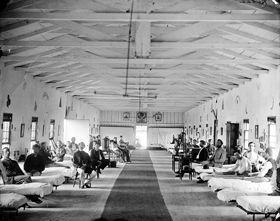The war has forced both North and South into a prolonged, anguished and uneasy conversation about death. Baptists (as well as other persons of faith) discuss death at a level perhaps never before witnessed, crafting a narrative of a “good death”–a passing which is wrapped in the honor of sacrifice for family and nation and the assurance of a heavenly reward for faithfulness to God and country.
Daily, Baptists North and South live and die within this comforting and assuring mantle designed to mask the horror and agony that is death. A story in this week’s North Carolina Baptist Biblical Recorder portrays an increasingly common death prose in which soldiers on their death beds voice joy and hope while cheering attendant chaplains and praising their distant mothers. This “good mother” narrative serves as a balm for families on the home front and a model for the “good death.”
It was just after a battle where hundreds of brave men had fallen, never to bear arms again, and where hundreds more were wounded, that a soldier came to the tent and said, “Chaplain, one of our boys is badly wounded, and wants to see you right away.”
Hurriedly following the soldier, I was taken to the hospital, and led to a bed upon which lay a young soldier. He was pale and blood stained from a terrible wound above the temple. I saw at a glance that he had but a few hours to live upon earth. Taking his hand, I said to him.” Well, my brother, what can I do for you?” The poor dying soldier looked up in my face, and placing his finger where his hair was stained with his blood, he said, “Chaplain, cut a big lock for mother! for mother, mind, Chaplain!” I hesitated to do it. He said, “Don’t be afraid, Chaplain, to disfigure my hair. It’s for mother, and nobody will come to see me in the dead-house to morrow.”
I did as he requested me. “Now, Chaplain,” said the dying man, “I want you to kneel down by me and return thanks to God!” For what?” I asked. “For giving me such a mother. Oh! Chaplain, she is a good mother; her teachings comfort and console me now. And, Chaplain, thank God that by His grace I am a Christian. Oh! what would I do now if I wasn’t a Christian! I know that my Redeemer liveth. I feel that his finished work has saved me. And, Chaplain, thank God for giving me dying grace. He has made my dying bed feel soft as downy pillows are.–Thank him for the promised home in glory. I’ll soon be there–there, where there is no war, nor sorrow, nor desolation, nor death–where I’ll see Jesus, and be forever with the Lord!”
I knelt by the dying man, and thanked God for the blessings he had bestowed upon him–the blessings of a good mother, a Christian hope, and dying grace to bear testimony to God’s faithfulness. Shortly after the prayer, he said, “Good-bye, Chaplain; if you ever see mother, tell her it was all well!”
Sources: “Then and Now: Death in the Civil War,” Public Broadcasting Corporation (link); Drew Gilpin Faust, “Death and Dying,” National Park Service (link); Drew Gilpin Faust, This Republic of Suffering: Death and the American Civil War, Alfred A. Knopf, 2008 (link); “The Christian Soldier in Death,” Biblical Recorder, February 27, 1864 (link)



